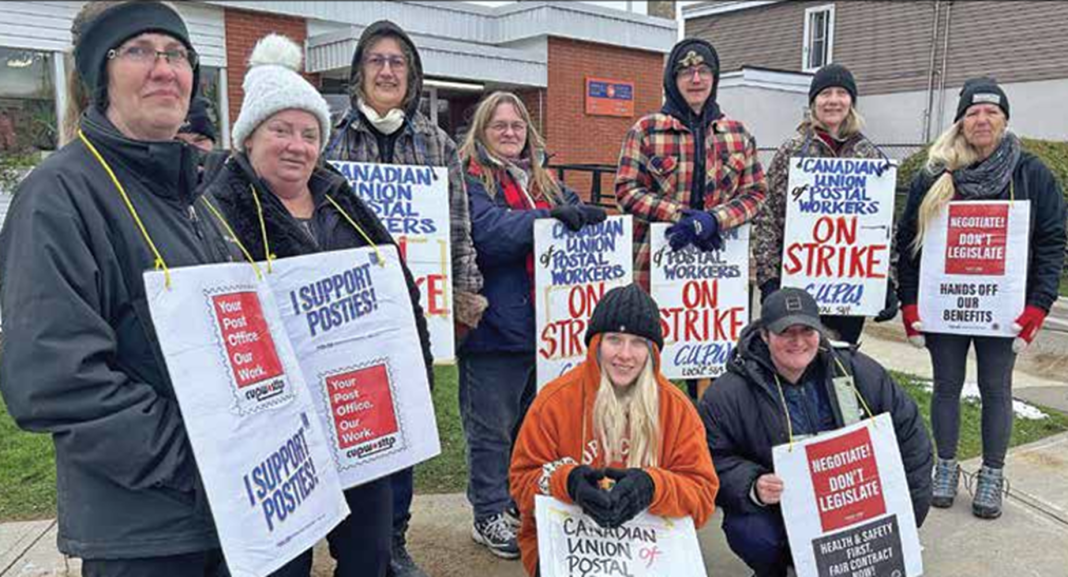Doug Ford, president of the Canadian Union of Postal Workers (CUPW) local 564 in Haliburton County, wasn’t surprised to hear that more than two thirds of Canada Post mail workers rejected the Crown corporation’s final contract offer last week.
About 55,000 of the Crown corporation’s employees have been working without a renewed contract for the past 18 months. Collective agreements for rural carriers expired Dec. 31, 2023, and for urban workers Jan. 31, 2024.
A month-long strike shuttered the country’s postal service between Nov. 15 and Dec. 17 last year, before the Canada Industrial Relations Board (CIRB) mandated a six-month temporary contract that restored operations. That deal, which carried a five per cent retroactive wage increase to the day after collective agreements expired, ran until May 22.
After negotiations between the two parties yielded little progress through the first half of 2025, federal jobs minister Patty Hajdu indicated she was going to send the issue to arbitration in late-May. However, Canada Post successfully argued it was within its rights to demand workers vote on its most recent offer.
According to CIRB, about 82.8 per cent of eligible voters cast a ballot – 43,370 of 53,614 active CUPW members – with 68.5 per cent of urban workers and 69.4 per cent of rural employees turning it down.
“The language that Canada Post has put in the global offers that the public has seen is only part of what’s going on – it’s all bullet point, there’s no actual details in there,” Ford told The Highlander. “That makes it hard [for people to vote yes] when they don’t actually know what they’re voting for.”
In a statement, Canada Post said the deal contained a 13.59 per cent wage increase over four years; signing bonuses of $500 to $1,000; removal of compulsory overtime for urban workers; and reversal of proposed changes to employee health benefits and pension contributions.
There was also a commitment to create new permanent flex positions to fill shifts for weekend delivery – with the Crown corporation saying new services on Saturdays and Sundays are vital to its longterm success.
Ford said those positions are almost exclusively part-time and would replace relief workers already employed by the company.
“When we were told they were going to create a new workforce, that’s not exactly true. All they’re really doing is getting rid of the pre-workforce we have now and giving them a new name and expanding their duties. It’s not really a new category,” Ford said.
“Our union is not against weekend delivery. All CUPW wanted was for [the current pre-workforce employees] to get weekend delivery assigned to them, so it would give them meaningful employment. That’s been the crux of this from the beginning,” he added.
In an Aug. 1 media release, Canada Post said it is “evaluating next steps following [the] vote outcome.”
The emailed statement read, “while we are disappointed in the results, we want to thank employees for participating in the process… this result does not lessen the urgent need to modernize and protect this vital national service. However, it does mean the uncertainty that has been significantly impacting our business – and the many Canadians and businesses who depend on Canada Post – will continue.”
Since 2018, Canada Post has accumulated over $3.8 billion in losses before taxes. It posted a $1.3 billion loss in 2024.
Company spokesperson Lisa Liu told The Highlander that, over the past two years, Canada Post has seen its share in the country’s parcel market drop from almost two-thirds of all deliveries to around 20 per cent.
“As we have not been able to make changes to our delivery model and have been negotiating for more than 20 months without resolution, businesses are choosing parcel delivery companies that provide a more convenient seven-day a week service,” Liu said.
Ford maintains workers in Haliburton County don’t want another strike but said they’re becoming disillusioned by the protracted negotiations.
He feels the next step will be Hadju sending CUPW and Canada Post to arbitration, which will force a new contract.
“I certainly hope she’s wise enough to do that… because there’s a lot on the line here,” he said. “It’s clear there isn’t a will for a strike… but the longer we go without a contract, who knows.”





